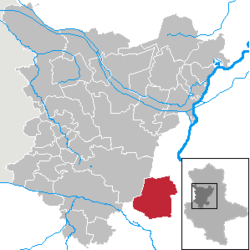Sülzetal
| Sülzetal | ||
|---|---|---|
|
||
| Coordinates: 52°0′0″N 11°31′47″E / 52.00000°N 11.52972°ECoordinates: 52°0′0″N 11°31′47″E / 52.00000°N 11.52972°E | ||
| Country | Germany | |
| State | Saxony-Anhalt | |
| District | Börde | |
| Government | ||
| • Mayor | Erich Wasserthal | |
| Area | ||
| • Total | 103.64 km2 (40.02 sq mi) | |
| Elevation | 83 m (272 ft) | |
| Population (2015-12-31) | ||
| • Total | 9,070 | |
| • Density | 88/km2 (230/sq mi) | |
| Time zone | CET/CEST (UTC+1/+2) | |
| Postal codes | 39171 | |
| Dialling codes | 039205 (Ortsteil Dodendorf 0391) | |
| Vehicle registration | BK | |
| Website | www.gemeinde-suelzetal.de | |
Sülzetal is a municipality in the Börde district in Saxony-Anhalt, Germany. It is situated on the Sülze creek, a tributary of the Elbe, about 10 km (6.2 mi) southwest of Magdeburg. Sülzetal was established on April 1, 2001 by the merger of the villages Altenweddingen, Bahrendorf, Dodendorf, Langenweddingen, Osterweddingen, Schwaneberg, Stemmern and Sülldorf. The Sülze valley is characterized by artesian aquifers, delivering brine (sulza) that had been used for salt production.
Seats in the municipal assembly (Gemeinderat) as of 2004 elections:
The first documentation of a settlement in the area dates back to 937 with the mention of Osterweddingen and Sülldorf. The village of Langenweddingen and Dodendorf were mentioned in 946 and 978 respectively as a possession of Saint Maurice's Abbey at Magdeburg. On May 5, 1809 the churchyard of Saint Christopherus at Dodendorf was the site of an attack by Prussian freikorps troops under Ferdinand von Schill and Ludwig Adolf Wilhelm von Lützow against the army of Napoleonic Westphalia. Lützow was severely wounded and had to face a court-martial for his arbitrary act.
The villages of Dodendorf, Osterweddingen and Langenweddingen have access to the railway line from Magdeburg to Thale, served by the Veolia Verkehr company since 2005. On July 6, 1967 the level crossing at Langenweddingen was the scene of one of the worst train accidents in Germany, when a bilevel train hit a tanker truck, resulting in an explosion that killed 94 people, many of them children on their way to a summer camp in the Harz mountains.
...
Wikipedia



